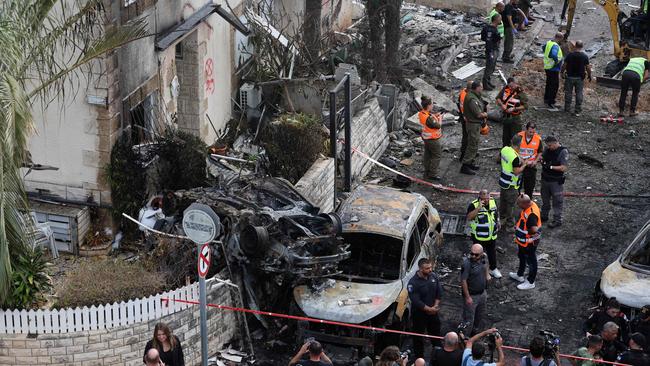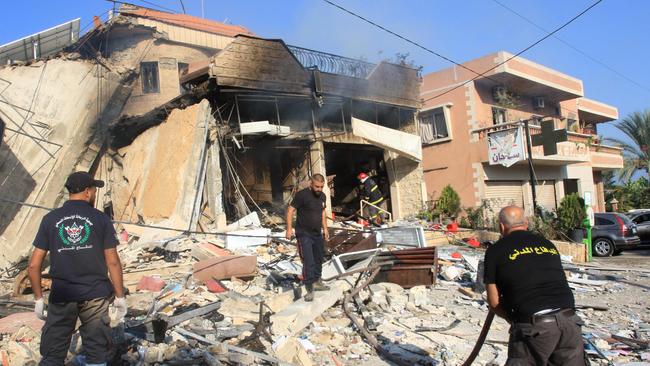Israel strike take outs Hezbollah missile commander
Fresh attacks follow worst bout of bloodshed between foes since 2006 conflict.

Israel launched airstrikes targeting senior Hezbollah military leaders overnight on Tuesday, as thousands of Lebanese fled their homes in the country’s south a day after a barrage of strikes killed hundreds in the country and heightened fears of an all-out war.
Israel’s military said an airstrike killed Hezbollah’s top missile commander, Ibrahim Muhammad Qabisi, and two other commanders in the southern Beirut suburb of Dahiyeh. The military said Qabisi was head of the group’s missile and rocket force and was close to senior military leaders. Hezbollah confirmed Qabisi’s death. Lebanon’s Ministry of Health said six people were killed and 15 wounded in a strike in the Beirut suburb.
The strike is another blow to Hezbollah, already reeling from the loss on Friday of its top military commander and elite Radwan commanders and the pager and walkie-talkie attacks that wounded many among its rank-and-file.
Israel’s military also launched dozens more airstrikes against Hezbollah military infrastructure and buildings it said housed weapons, while warning Lebanese residents to avoid buildings connected to the terrorist group. Israeli military spokesman Daniel Hagari said Hezbollah fired 300 projectiles into Israel, injuring six people.
Roads were blocked as people fled southern Lebanon on Tuesday after the Israeli military broadcast evacuation orders on Monday that it said were designed to move civilians out of harm’s way. Many people were stuck overnight on the roads to Beirut, with some even returning home because of the traffic jams. The Lebanese Minister of Health said thousands had been displaced. Airlines cancelled flights to and from Beirut.
Israel has sharply raised the intensity of its military operations against Hezbollah over the past week in the hope of persuading the militia to stop firing on Israel’s north, which would allow tens of thousands of displaced residents to return to their homes.
The US and Arab governments are concerned the surge in fighting risks spiralling into an all-out war after nearly a year of low-intensity fighting, sparked when Hezbollah began firing rockets across the border shortly after the Hamas-led October 7 attacks on southern Israel.
Monday’s strikes were by far the deadliest skirmishes in the current hostilities and the worst bout of bloodshed between Israel and Hezbollah since their month-long conflict in 2006. Since Monday, the strikes have killed more than 550 people, including dozens of women and children, and wounded more than 1800, according to Lebanese authorities.
The Israeli military has said Hezbollah uses civilian infrastructure to launch attacks and published what it said were pictures of weapons, including long-range missiles, inside homes in Lebanon.

The US has sought to negotiate a ceasefire between Israel and Hamas in Gaza that could also calm fighting with Hezbollah, which has vowed to maintain its rocket attacks on Israel in support of Hamas until there is a ceasefire in Gaza.
Iran backs both Hamas and Hezbollah. Iranian President Masoud Pezeshkian said the fighting in Lebanon risks expanding to the rest of the Middle East. “Hezbollah cannot stand alone against a country that is being defended and supported and supplied by Western countries, European countries and the United States,” Mr Pezeshkian told CNN.
Israel isn’t interested in a full-scale war, Foreign Minister Israel Katz wrote in a letter Monday to the UN Security Council. Mr Katz urged the UN to enforce Security Council resolution 1701, a decision intended to settle the 2006 Lebanon war between Israel and Hezbollah and which called for a withdrawal of armed groups from the area south of Lebanon’s Litani River.
Israeli Prime Minister Benjamin Netanyahu is expected to speak later this week at the UN General Assembly in New York. His government on Monday approved a one-week “special situation” for the entire country, which gives the government the power to impose restrictions on communities because of the security situation. Such restrictions had already been in place near the border with Lebanon.
More than 8800 rockets, missiles and drones have been fired by Hezbollah into Israel since October 8. The Israeli military has also struck Lebanon more than 8000 times by air, drone, missile and artillery in the same period, according to the non-profit Armed Conflict Location and Event Data.
The Wall Street Journal



To join the conversation, please log in. Don't have an account? Register
Join the conversation, you are commenting as Logout